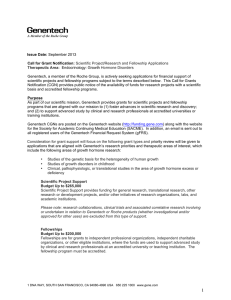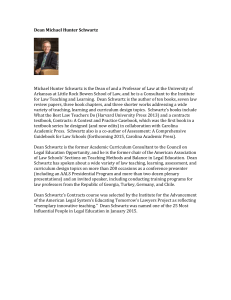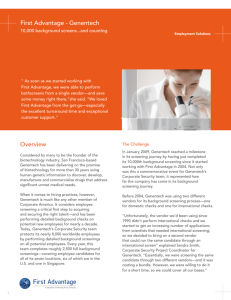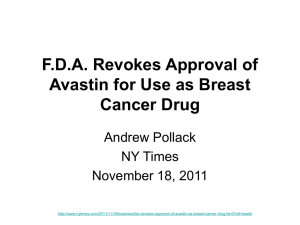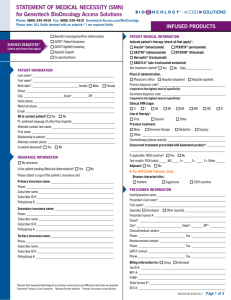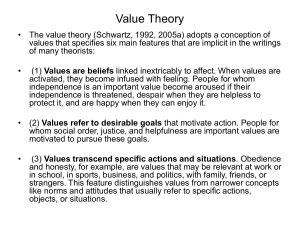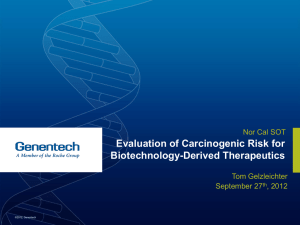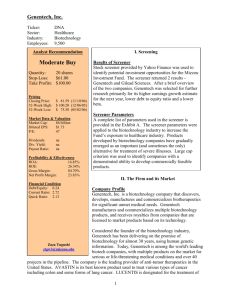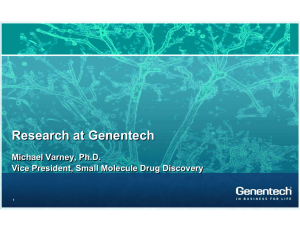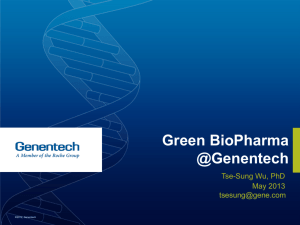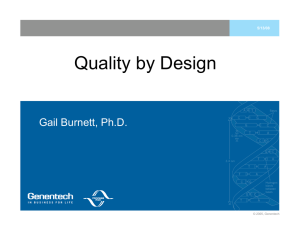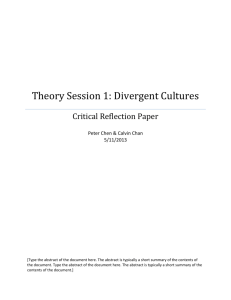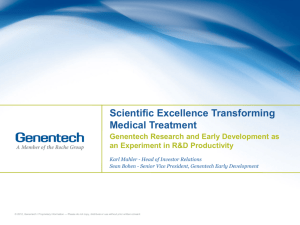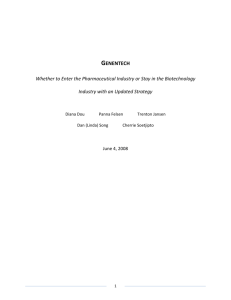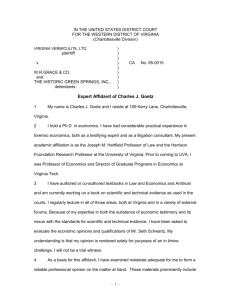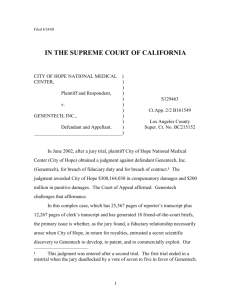Bayhill Therapeutics Snags $350M Deal with Genentech
advertisement
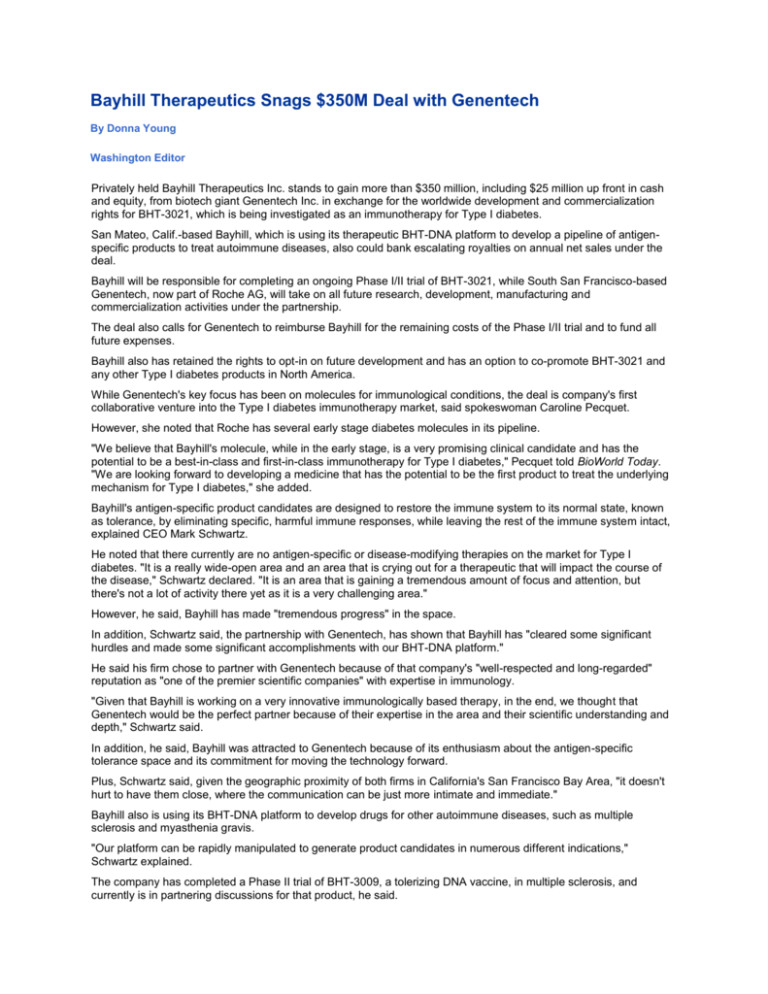
Bayhill Therapeutics Snags $350M Deal with Genentech By Donna Young Washington Editor Privately held Bayhill Therapeutics Inc. stands to gain more than $350 million, including $25 million up front in cash and equity, from biotech giant Genentech Inc. in exchange for the worldwide development and commercialization rights for BHT-3021, which is being investigated as an immunotherapy for Type I diabetes. San Mateo, Calif.-based Bayhill, which is using its therapeutic BHT-DNA platform to develop a pipeline of antigenspecific products to treat autoimmune diseases, also could bank escalating royalties on annual net sales under the deal. Bayhill will be responsible for completing an ongoing Phase I/II trial of BHT-3021, while South San Francisco-based Genentech, now part of Roche AG, will take on all future research, development, manufacturing and commercialization activities under the partnership. The deal also calls for Genentech to reimburse Bayhill for the remaining costs of the Phase I/II trial and to fund all future expenses. Bayhill also has retained the rights to opt-in on future development and has an option to co-promote BHT-3021 and any other Type I diabetes products in North America. While Genentech's key focus has been on molecules for immunological conditions, the deal is company's first collaborative venture into the Type I diabetes immunotherapy market, said spokeswoman Caroline Pecquet. However, she noted that Roche has several early stage diabetes molecules in its pipeline. "We believe that Bayhill's molecule, while in the early stage, is a very promising clinical candidate and has the potential to be a best-in-class and first-in-class immunotherapy for Type I diabetes," Pecquet told BioWorld Today. "We are looking forward to developing a medicine that has the potential to be the first product to treat the underlying mechanism for Type I diabetes," she added. Bayhill's antigen-specific product candidates are designed to restore the immune system to its normal state, known as tolerance, by eliminating specific, harmful immune responses, while leaving the rest of the immune system intact, explained CEO Mark Schwartz. He noted that there currently are no antigen-specific or disease-modifying therapies on the market for Type I diabetes. "It is a really wide-open area and an area that is crying out for a therapeutic that will impact the course of the disease," Schwartz declared. "It is an area that is gaining a tremendous amount of focus and attention, but there's not a lot of activity there yet as it is a very challenging area." However, he said, Bayhill has made "tremendous progress" in the space. In addition, Schwartz said, the partnership with Genentech, has shown that Bayhill has "cleared some significant hurdles and made some significant accomplishments with our BHT-DNA platform." He said his firm chose to partner with Genentech because of that company's "well-respected and long-regarded" reputation as "one of the premier scientific companies" with expertise in immunology. "Given that Bayhill is working on a very innovative immunologically based therapy, in the end, we thought that Genentech would be the perfect partner because of their expertise in the area and their scientific understanding and depth," Schwartz said. In addition, he said, Bayhill was attracted to Genentech because of its enthusiasm about the antigen-specific tolerance space and its commitment for moving the technology forward. Plus, Schwartz said, given the geographic proximity of both firms in California's San Francisco Bay Area, "it doesn't hurt to have them close, where the communication can be just more intimate and immediate." Bayhill also is using its BHT-DNA platform to develop drugs for other autoimmune diseases, such as multiple sclerosis and myasthenia gravis. "Our platform can be rapidly manipulated to generate product candidates in numerous different indications," Schwartz explained. The company has completed a Phase II trial of BHT-3009, a tolerizing DNA vaccine, in multiple sclerosis, and currently is in partnering discussions for that product, he said. The Phase II data demonstrated that patients receiving 0.5 mg of BHT-3009 had a decrease in brain lesions. During the follow up period, a trend in the reduction of relapse rates also was observed. In addition, the results indicated a tolerizing effect on the immune system as measured by reduction of myelin-specific antibodies in cerebral spinal fluid. BHT-3009 was well tolerated, with no significant adverse effects reported. Bayhill's pipeline also includes BHT-3034, which Schwartz said has shown some "very solid and robust" outcomes in preclinical studies as a candidate for myasthenia gravis, an autoimmune response attack of the acetylcholine receptors, which block nerve impulses and muscle stimulation via the neurotransmitter acetylcholine. The condition results in patients experiencing chronic fatigue, weakness, double vision and, in some cases, respiratory distress. Schwartz noted that his 14-employee firm has been pioneering the development of antigen-specific therapies for more than seven years. The Genentech partnership, he said, is the "pivotal point" for the firm in moving its technology platform forward. "It's a huge step forward for all of the various stakeholders in a new technology with promise," Schwartz said. "Antigen-specific therapy will come of age, and it will fundamentally change the way autoimmune diseases are treated. We believe we are on the forefront of that, and this deal validates that we are making tremendous progress toward that end." Published June 11, 2009 in BioWorld Today


